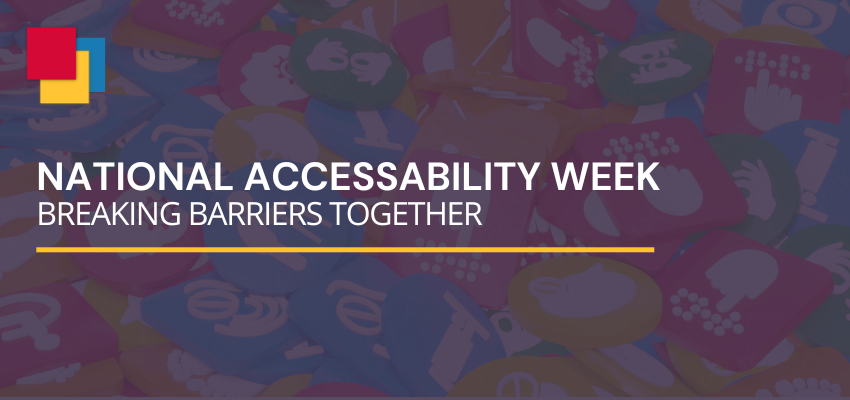Breaking Barriers Together: Celebrating National AccessAbility Week

The College of Social and Applied Human Sciences (CSAHS) proudly joins communities across the country in celebrating National AccessAbility Week, taking place from May 25 to 31, 2025. National AccessAbility Week is a time to celebrate accessibility and inclusion within our communities. It honours the achievements and valuable contributions of people with disabilities, while also highlighting the ongoing work needed to eliminate barriers across our University.
This week served not only as a celebration of progress but also as a call to action. It is an invitation for everyone to deepen their understanding of accessibility and disability inclusion, challenge stigma, and work together to create a more equitable and welcoming environment.
Centers and Institutes Championing Accessibility
Through intentional initiatives, impactful research, and ongoing efforts, CSAHS is dedicated to raising awareness and driving meaningful change, placing accessibility at the heart of its mission to foster an inclusive environment where everyone can thrive. At CSAHS, we proudly host several leading centers and institutes that champion accessibility through innovative, community-driven initiatives and research:
Arrell Food Institute
The Arrell Food Institute builds on Canada's reputation as a leader in food research and education. It focuses on food security and sustainability while prioritizing inclusive practices to ensure that everyone has access to healthy, sustainable food. There is no question that today’s food systems must adapt to the challenge of feeding a growing global population amid climate change and limited resources such as soil and water. Technology presents a vital opportunity to produce more food using fewer resources. Through the Arrell Food Institute’s research on sustainable food systems for Canada, efforts are being made to ensure these technologies are not only innovative but also accessible—supporting long-term resilience and advancement in the agri-food sector.
Canada India Research Centre for Learning and Engagement
The Canada India Research Centre for Learning and Engagement (CIRCLE) promotes cross-cultural learning and engagement, fostering research connections between Canada and India/Indian diaspora. CIRCLE showcases, advocates, and builds on research specifically on emerging topics in sustainability and social and economic well-being. A key part of their work includes championing accessibility, ensuring that research and knowledge-sharing practices are inclusive, equitable, and accessible to diverse communities.
Community Engaged Scholarship Institute
The Community Engaged Scholarship Institute (CESI) bridges the gap between academia and the community, advocating for inclusive participation and equitable access to resources and knowledge. CESI offers sessions and workshops to help students understand why accessibility matters and how to implement accessibility practices in their projects.
Live Work Well Research Centre
The Live Work Well Research Centre (LWWRC) is dedicated to improving the quality of life for diverse populations, with a strong emphasis on work-life balance, family well-being, and social inclusion. LWWRC's "Disabilities, Access, and Inclusion Cluster" takes an intersectional approach to exploring experiences of disability and highlights the importance of the participation of people with disabilities. Learn more about this project by reading LWWRC’s 2023–24 Annual Report.
Maplewoods Centre for Family Therapy and Child Psychology
The Maplewoods Centre for Family Therapy and Child Psychology ensures a barrier-free experience for clients and visitors from the moment they arrive. The building features a step-free, accessible path of travel, with powered exterior doors activated with pushbutton activation and wide doorways that accommodate various mobility aids and wheelchairs. Elevators provide access between the clinic’s two floors, and accessible washrooms are available on each level. Throughout the centre, public spaces include accessible seating, creating a welcoming and inclusive environment for all.
Beyond physical accessibility, Maplewoods promotes equitable access to mental health services by offering both in-person and virtual care options. The clinic provides affordable therapy and psychological support tailored to the needs of children and families, helping to reduce barriers to essential care.
ReVision: The Centre for Art and Social Justice
ReVision: The Centre for Art and Social Justice harnesses the transformative power of art to challenge social inequities, amplify marginalized voices, and promote inclusion through accessible, socially engaged practices. Through innovative arts-based research and community engagement, ReVision advances equity and accessibility at the intersection of art, disability, and social justice.
One of their key research initiatives, “From InVisibility to Inclusion: Episodic Disabilities in Ontario Workplaces,” focuses on improving social, economic, and employment opportunities for people living with episodic disabilities (EDs). This project aims to bring greater awareness to the unique challenges faced by individuals with EDs and to foster more inclusive and supportive workplace environments across Ontario.
Together, these centers and institutes reflect the University's deep commitment to advancing accessibility and inclusivity in diverse and impactful ways. By ensuring that individuals with disabilities have equal opportunities to contribute, we help build stronger communities and a brighter, more inclusive future for all.
To learn more about how you can enact accessibility best practices and access supports on campus, visit the Increasing Access at U of G: Celebrating National AccessAbility Week news page.